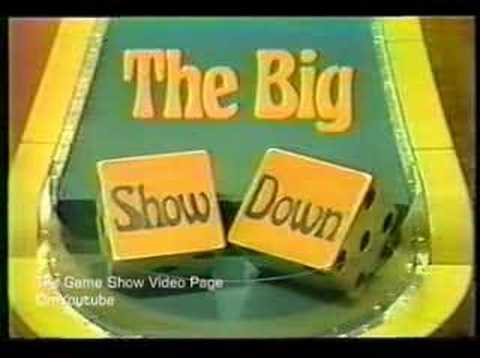|
 These three players will compete in a classic battle of knowledge and strategy, and one of them will have the chance to win a top prize, today on... These three players will compete in a classic battle of knowledge and strategy, and one of them will have the chance to win a top prize, today on...
SHOW: The Big Showdown AIR DATES: December 23, 1974 to July 4, 1975
CREATOR: Don Lipp
PACKAGER: Don Lipp Productions; Ron Greenberg Productions
HOST: Jim Peck
WATCH IT HERE: YouTube
"The Big Showdown" has a place in game show history. Not because it was a particularly memorable show or that it had a "Bob Larsen" or "Thom McGee" type of contestant that set the show in stone. No, the only thing people most remember from the show was the one time host Jim Peck trotted down the steps to make a typical host entrance and slipped down the stairs. Keeping his smile as the audience laughed and clapped, Peck said, "Yeah, you people would applaud a lynching." Not exactly PC of him, I'm sure, but "The Big FALLdown" (as shown in the episode in the link above) was, perhaps, the most exciting thing about this "born on Christmas, dead on July 4" show's run. Not that it didn't have its charm, mind. Even as a toddler, I wanted my Mom to make the big dice out of my letter blocks. But, looking back, it didn't really have much going for it.
HOW WAS IT PLAYED?
MAIN GAMEPLAY
Three contestants - including a returning champion if there is one - play this game.
MAIN ROUND
Six categories are shown, each with a point value from 1 to 6 (higher point values do not denote higher difficulty, though). A "payoff point" is set and a value for hitting said point (a wheel on the host podium would spin between $25 and $500 and would be stopped by the host). A toss-up question for one point is asked. The one who buzzes in with the right answer gets the point and gets to choose the next category/point value. All questions are toss-up. When someone hits the "payoff point" EXACTLY, they earn the money and the "point" and value are reset. If the value of the chosen question would put a contestant OVER the "payoff point", they would be unable to buzz-in. Points accumulate throughout the round. After the second "payoff point" is hit, the categories change up.
This is a timed round. An alarm bell will ring when it's down to 90 seconds. When a "payoff point" has been hit just before or anytime after the alarm, all remaining "points" are worth $100. When the 90 seconds elapses, the two players with the most points advance. A tie-breaker question is used if needed.
THE FINAL SHOWDOWN
The two remaining players are shown THREE categories worth one, two and three points. Again, a toss-up is asked for one point and control of the board. There's only one "payoff point": seven. The first contestant to reach seven points without going over wins the game, $250 and advances to the bonus round as champion. Everyone kept any money won during the game.
BONUS ROUND
The champion now gets to roll a pair of dice for up to $10,000. The dice are just like any other, save that the "sixes" are replaced with "SHOW" and "DOWN" (and have a value of zero). The champion starts with one roll and, if they roll "SHOWDOWN", they win $10,000. If they don't, the number they roll is designated the "payoff point" for the round. The champion is then given thirty seconds to roll "SHOWDOWN" for $5000. Every time the "payoff point" is rolled, the contestant wins $250 and gets five more seconds at the end of the initial thirty (if they roll the point during the extra time, it does NOT count for five more seconds or more money). The champion keeps all money earned in this round, whether they roll "SHOWDOWN" or not. If they win the $5000 or the $10,000, they retire as champion.
WHAT WORKED?
It's a shame that Jim Peck didn't host more shows. But, then again, he did host the debacle that was "3's a Crowd" that more-or-less killed both his and Chuck Barris' career. Still, he had a way to keep the game going as swiftly as possibly, which is important in a timed game like this one.
The bonus round was quite exciting. And, considering how big an amount $10,000 or even $5000 was in the early 70s, it made sense to make it a 1 in 36 chance in each roll to win it. Maybe they could've done it more like "Time Is Money" on "The Price Is Right" and just take a certain amount off the bonus for each roll or for each second...but, given the tech of the day, this was, perhaps, the best option.
WHAT DIDN'T WORK?
The set was needlessly big. Those stairs were just so the host could make a more flashy entrance...and we all saw how THAT turned out. Just have him enter from behind the cameras or the board. And the categories could've been just put on a screen, "Joker's Wild"-style.
That being said, could they not have made the dice-rolling table a LITTLE bigger? Peck was swiping those dice in and getting his hand out JUST as the next pair was arriving in the pit.
Nothing too bad about the front game save that it gets repetative. Interesting that folks can use strategy to keep players locked out of questions, but, if they don't know the answer, they can just keep trying. That slows the show to a crawl. Maybe if each question was open to all and, if they went over, they just didn't GET the points, that would've been better.
WOULD IT WORK TODAY?
While the bonus game has its charm and uniqueness, it goes far too fast and the main game does get a bit repetative after a while. If the main game were adjusted while still keeping the "dice" motif, it might have a chance on Buzzr or GSN. It had its excitement...but only about as much as ANOTHER Donn Lip Production...
NEXT TIME: The original a-MAZE-ing race...
Chris Wolvie WOULD applaud a lynching...provided it's anyone in Washington, D.C. Follow him on Twitter @ChrisWolvie and e-mail him at chriswolvie@yahoo.com. |


